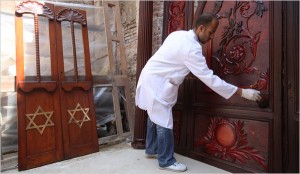A Synagogue’s Unveiling Exposes a Conundrum
Egypt spent $1.8 million to restore the synagogue and office space where Maimonides once worked and studied in Cairo.
CAIRO — Down a winding alley, deep in a quiet neighborhood of rutted roads and donkey carts, where food vendors sold cheap sandwiches and children chased after a soccer ball, an extraordinary moment passed here with little notice: Jews and Muslims, Israelis and Egyptians sat together and celebrated their shared heritage.
But no one outside the small group of invited guests was allowed to see.
Egypt spent $1.8 million to restore a part of its historic past, the synagogue and office space of Rabbi Moses Ben Maimon, known in the West as Maimonides, the 12th-century physician and philosopher who is considered among the most important rabbinic scholars in Jewish history. On March 7, security men held up a canvas curtain to block the road and barred the news media from attending.
The restoration project, and its muted unveiling, exposed a conundrum Egyptian society has struggled with since its leadership made peace with Israel three decades ago: How to balance the demands of Western capitals and a peace process that relies on Egypt to work with Israel with a public antipathy for Israel.
The efforts to restore the synagogue but keep it quiet illustrate the contortions of a government that often tries to satisfy both demands simultaneously.
“This is an Egyptian monument; if you do not restore a part of your history you lose everything,” said Zahi Hawass, the general secretary of the Supreme Council of Antiquities, which approved and oversaw the project. “I love the Jews, they are our cousins! But the Israelis, what they are doing against the Palestinians is insane. I will do anything to restore and preserve the synagogue, but celebration, I cannot accept.”
Israel opened its embassy in Cairo just over 30 years ago. In that time, the debate over how to deal with Israel has grown more complicated, at times more nuanced, as the government and intellectuals try to navigate between a desire to preserve a cold peace while also bending to pragmatic economic, social and political realities, political analysts said.
There is no appetite in Egypt for normalization of relations. But there has never been a firm definition of where the line should be drawn, and that is where the debate often falls.
Are Egyptian reporters to be barred from interviewing Israeli officials?
Can artists show their works at a show that also showcases Israeli work?
“With regards to relations with Israel, Egyptians generally and Arabs specifically fall in the deep abyss of confusion and doubt and stagger around the boundaries of this relation, where it starts and where it ends,” wrote Salama Ahmed Salama, in the independent daily newspaper Shorouk.
The problem arose when Anwar Sadat decided to strike peace with Israel without also resolving all the other Arab issues. Egyptian intellectuals felt obligated to take a stand in support of Palestinians, so they called for boycotting normalization.
But over the years, the picture has become clouded as Egypt has made economic deals with Israel, sold it natural gas, welcomed Israeli officials and sent Egyptian officials to Israel. It also has become complicated by Al Jazeera, the popular satellite news channel that regularly covers events in Israel and the occupied territories.
Recently, two cases crystallized the public debate. Hala Mustafa, the editor of one of Egypt’s premier political journals, Democracy, was formally censured last month for having met the Israeli ambassador in her office. It was first time the journalists’ syndicate punished a member for defying a ban on normalization since the group was founded in 1941, according to the independent daily newspaper Al Masry Al Youm.
Even some of her critics, who strongly disagree with Ms. Mustafa’s politics, said they were surprised at the selective nature of the condemnation. Singling out Ms. Mustafa said as much about the way the state and state-aligned institutions apply laws and rules, critics said, as it did about widespread hostility to Israel.
“Accountability here is very selective because the law does not prevail over society,” said Magdy el-Gallad, chief editor of Al Masry Al Youm. “The law is there but its enforcement is subject to personal criteria and political settlements and accounts. And this is what we saw in Hala Mustafa’s case.”
No one can say where to draw the line.
Mr. Gallad was willing, for example, to attend a meeting organized by President Obama, even though an Israeli attended, while another popular writer, Fahmy Howeidy, refused.
While Ms. Mustafa was punished, six top Egyptian scholars, including some from the nation’s premier research center, the Ahram Center for Political and Strategic Studies, attended a conference with the Israeli ambassador. None of them were punished.
When the subject of restoring the synagogue of Maimonides was first raised about two years ago, Egypt agreed to do the work, but asked that it not be made public. The project was announced a year later when the culture minister, Farouk Hosny, was hoping to become the next director general of Unesco, the United Nations Educational, Scientific and Cultural Organization. When his bid for the post failed, many doubted whether the project would be completed.
But the work was completed, and at first the authorities told members of the Egyptian Jewish community that the news media could not attend the ceremony because they wanted to make the official announcement themselves. Then Dr. Hawass announced he was canceling that, too.
“I am trying to give the Israelis a message that they should make peace,” Dr. Hawass said.
Rabbi Andrew Baker, of the American Jewish Committee, had hoped to publicly congratulate Egyptian officials for the work when he spoke during the ceremony. But his speech was never heard beyond the synagogue walls.
“It’s a sad commentary on the current state of affairs, even if it is not surprising,” Rabbi Baker said in an e-mail message after returning to the United States. “All along in our discussions over the years, they have been fearful of critical voices in Egypt, who conflate criticism of the State of Israel with Egyptian Jews and their heritage. This is a process that has been years in development, and it will not be quickly or easily reversed.”
Mona El-Naggar contributed reporting.




